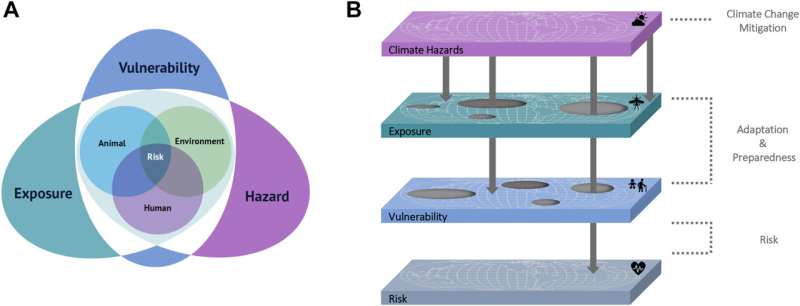This article has been reviewed according to Science X's editorial process and policies. Editors have highlighted the following attributes while ensuring the content's credibility:
fact-checked
proofread
Empowering Europe against infectious diseases: An innovative framework to tackle climate-driven health risks

Climate change is one of several drivers of recurrent outbreaks and geographical range expansion of infectious diseases in Europe.
The paper "Decision-Support Tools to Build Climate Resilience Against Emerging Infectious Diseases in Europe and Beyond," published on The Lancet Regional Health—Europe journal, introduces a transformative approach to tackle the emergence and transmission of climate-sensitive infectious diseases in Europe, informing cross-sectoral policy while improving the long-term climate resilience of health systems to infectious disease risks.
The paper is authored by a distinguished team of international researchers as part of their work in IDAlert, the international project with contribution of CMCC will help build a Europe more resilient to emerging health threats. CMCC@Ca'Foscari researchers Shouro Dasgupta, Katie Johnson, and Francesco Bosello contributed to socio-economic inequality, adaptation strategies, and stakeholders involvement aspects of the paper, which proposes a collaborative approach to develop policy-relevant indicators and decision-support tools.
These tools are designed to comprehensively track and anticipate climate-induced disease risks across various domains, including environmental hazard, exposure patterns, and vulnerability factors. With a keen focus on the interconnectedness of animals, humans, and the environment, the framework promises a holistic perspective to address this multifaceted challenge.
The lead author and IDAlert project coordinator Joacim Rocklöv said, "Our decision-support tools offer a multi-dimensional perspective that transcends traditional silos. By examining the nexus of animals, humans, and the environment, we're unlocking a more comprehensive understanding of disease dynamics a prerequisite for more timely and effective outbreak preparedness."
The heart of this novel framework lies in the co-production of early warning and response systems with stakeholders and end-users, as well as tailored tools to assess the costs and benefits associated with climate adaptation and mitigation strategies across diverse sectors. By fostering greater resilience within regional and local health systems, the framework aims to strengthen Europe's capacity to respond to health crises, even in the face of changing environmental conditions.
As part of its approach, the IDAlert project will integrate multi-level engagement, innovative methodologies, and novel data streams, and tap into locally generated intelligence and empirical insights through case studies. This strategy empowers experts to quantify the effects of climate-induced disease threats in areas undergoing rapid urban transformation and contending with heterogeneous health risks.
The ultimate aspiration is to bridge the gap between knowledge and action, delivering an unparalleled integrated One Health—Climate Risk framework that will empower policymakers, health care professionals, and communities to mitigate risks and bolster resilience.
More information: Joacim Rocklöv et al, Decision-support tools to build climate resilience against emerging infectious diseases in Europe and beyond, The Lancet Regional Health—Europe (2023). DOI: 10.1016/j.lanepe.2023.100701





















